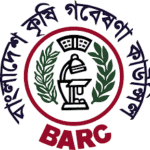A strategic partnership to enhance food security, leveraging Saskatchewan and Canada’s expertise in agriculture and biotechnology.
About the partnership
In 2020, the Global Institute for Food Security (GIFS) and the Bangladesh Agricultural Research Council (BARC) entered into a multidisciplinary research, training and development partnership to help promote sustainable food security within Bangladesh. BARC, under the Ministry of Agriculture, is the apex body within Bangladesh’s National Agricultural Research System (NARS).
The five-year agreement, defined in a Memorandum of Understanding (MOU), is advancing knowledge and technologies for agricultural research and development in Bangladesh. This work is taking place through a consortium jointly led by GIFS and BARC.
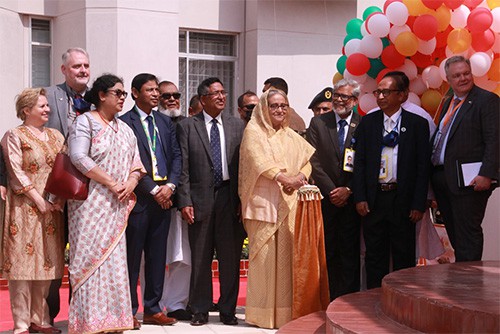
Her Excellency Sheikh Hasina MP, Honourable Prime Minister, Government of the People’s Republic of Bangladesh, and other dignitaries attended the inauguration of the Bangabandhu-Pierre Elliott Trudeau Agriculture Technology Centre (BP-ATC) in February 2023.
Objectives
The partnership is designed to help promote sustainable food security in Bangladesh by advancing knowledge transfer and technology development for agricultural research within the country.
Using Saskatchewan and Canada’s strengths in the agri-food and biotechnology sectors, and engaging various research institutes, our partnership will deliver programs to Bangladesh that are focused on:
- Utilizing new technologies to enhance NARS’ agricultural research capabilities.
- Developing human capital and advanced technologies.
- Integrating climate resilience and sustainability into all projects.
- Delivering productivity and value-added outcomes that support women and enhance farmer incomes.
- Strengthening the country’s delivery of the United Nations Sustainable Development Goals.
Highlights
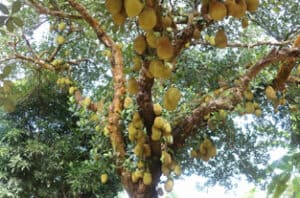
First sequenced genome of year-round jackfruit
A technological accomplishment produced by the GIFS-Bangladesh partnership has made Bangladesh one of only a few southeast Asian countries to sequence a genome entirely.
The following items are just a few updates and outcomes of the ongoing partnership and collaboration between GIFS and BARC. Click the links for more information on each of these developments.
- GIFS partnership celebrates inaugration of ag-tech centre
GIFS is pleased to announce the inauguration of an agricultural technology centre at the Bangladesh Rice Research Institute. - GIFS announces Bangladesh Office and establishes research chair
The GIFS Regional Office in Bangladesh will support GIFS’ multidisciplinary research, training and development partnership with BARC. - Partnership highlights trade, investment and co-operation opportunities
Saskatchewan’s agri-food ecosystem, technology transfer and trade opportunities were highlighted as representatives of the Government of Bangladesh visited GIFS at USask.
Background
The GIFS-BARC partnership is a natural alliance, combining research and technology strengths from Canada and Bangladesh to promote sustainable food security in the country.
The partnership will strengthen Bangladesh’s National Agricultural Research System with a focus on enhancing farmer incomes, addressing the effects of climate change and strengthening the country’s delivery of the United Nations Sustainable Development Goals, including reducing hunger and empowering women.
About GIFS and BARC
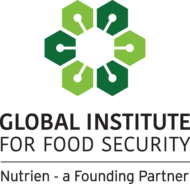 |
Global Insitute for Food Security (GIFS) GIFS has a vision of a world where everyone has access to safe and nutrition food. A public-private-academic partnership located at the University of Saskatchewan in Saskatoon, Saskatchewan, Canada, GIFS works with partners to discover, develop and deliver innovative solutions for the production of globally sustainable food.
|
|
|
Bangladesh Agricultural Research Council (BARC) BARC aims to create a future where Bangladesh has an efficient, effective and sustainable agricultural research system. Their work enhances the research capacity for agricultural development through innovation, technology and partnerships. |
Why Bangladesh?
Canada and Bangladesh have enjoyed a strong partnership since diplomatic relations were established in the early 1970s following the latter’s 1971 war of independence.
Trade is a major part of that partnership and one that continues to grow alongside the Bangladesh economy, which is among the fastest growing in the world. Canada’s main exports to Bangladesh include cereals, pulses and fertilizer, which make it a high-priority trading partner for Saskatchewan — a major exporter of these and other commodities.
The Bangladesh government is keen to adopt new technologies and the country is making significant investments in its national infrastructure, including the launch of a 2041 strategy to achieve a food surplus in the country.
The GIFS-Bangladesh partnership seeks to build on the longstanding connection between the two countries and help both partners to achieve their future goals. The resulting outcomes will promote Canada and Saskatchewan’s trade and export goals, including the Province of Saskatchewan’s Growth Plan targets of increased trade and exports, while enhancing agricultural technology, research and production within Bangladesh.
Saskatchewan's strengths
Saskatchewan is a world-class centre for agriculture with one of the world’s strongest agri-science ecosystems. The province is home to both major agricultural companies and highly productive and innovative farmers, as well as GIFS, the Global Institute for Water Security (GIWS) and the College of Agriculture and Bioresources at the University of Saskatchewan, the National Research Council (NRC), Saskatchewan Food Industry Development Centre and Prairie Agricultural Machinery Institute (PAMI).
A partnership with Bangladesh extends Saskatchewan’s global impact even further — opening up avenues to promote the Province’s research and development strengths in agriculture, agri-food and technology.
By working collaboratively with various stakeholders, GIFS is driving an international and multilateral partnership truly designed to enhance relations, advance trade and deliver economic value for all jurisdictions.
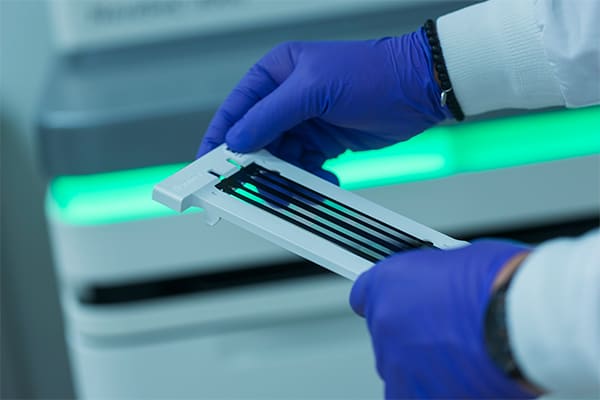
Our Work
The GIFS Regional Office is located at the BARC campus in Dhaka, Bangladesh, providing the organization with an on-the-ground presence to support the multidisciplinary research, training and development partnership with BARC.
This office assists the partnership’s activities and is strengthening co-operation between Canada and Bangladesh’s agriculture sectors.
Bangabandhu Research Chair in Food Security

The agricultural research and development activities within the GIFS-Bangladesh Partnership are led by Dr. Andrew Sharpe (Phd), GIFS’ Bangabandhu Research Chair in Food Security, and a leading international expert in the use of genomic technologies for the advanced breeding of various crops.
Sharpe’s research accomplishments include helping to sequence the wheat, canola, barley and black mustard genomes, as well as phenotyping experience through GIFS’ Plant Phenotyping and Imaging Research Centre program at USask.
Under Sharpe’s leadership, the Bangabandhu Research Chair in Food Security is working with BARC to establish an agricultural technology centre in Bangladesh, where the Saskatchewan ecosystem partners will collaborate with Bangladesh partners to accomplish the following goals:
- Enhance crop breeding and plant improvement;
- Advance soil health and quality;
- Improve soil water retention; and
- Deliver innovations for postharvest food handling and processing — a specific area of concern for the country.
To complement these research activities, a second Bangabandhu Research Chair has also been constituted, based at Bangabandhu Sheikh Mujibur Rahman Agricultural University (BSMRAU) in Bangladesh.

Dr. Ashutosh Sarker (Phd), Bangabandhu Research Chair — Bangladesh, has more than four decades of research and management experience. He has worked as a pulse breeder in Bangladesh and at the International Center for Agricultural Research in the Dry Areas (ICARDA). He is author of more than 300 publications in peer-reviewed journals, popular articles and symposia proceedings and has led the development of 52 pulse varieties that are cultivated by farmers in Africa and Asia. Sarker is involved in research guidance to GIFS-BARC activities.
Named in honour of Bangladesh’s first President and Prime Minister, Sheikh Mujibur Rahman, the Chair will lead vital agricultural research and development activities between Saskatchewan and Bangladesh in support of the partnership’s goals.
Platform Technologies
The GIFS-BARC partnership will make use of the resources and expertise in the following Platform Technologies at GIFS, including:
- Omics and Precision Analytics Laboratory (OPAL) for genome sequencing and genotyping using state-of-the-art DNA sequencing machines, including short-read (Illumina) and long-read (PacBio and Oxford Nanopore) instruments.
- Cell Biology and Plant Growth Facilities for high-throughput production and phenotypic characterization of structured genetic plant populations in controlled environments.
- Data Management and Analytics for the efficient management, analysis and interpretation of large omics datasets for application in research projects and optimal selection in crop breeding programs.
Bangabandhu Research Chair Post-Doctoral Fellowship Program and PhD Fellowship in Food Security
Post-Doctoral and PhD Fellowships are supporting needs-based research and enhancing co-operation between Bangladesh and Canada in the fields of agricultural research and academia.
The initiative is supported by GIFS and the University of Saskatchewan, as well as the National Agricultural Research System Institutes in Bangladesh and BSMRAU.
Four Post-Doctoral Fellows (two from the Bangladesh Agricultural Research Institute (BARI) and two from the Bangladesh Rice Research Institute BRRI) have already been selected to conduct research in both countries in the research areas of plant genomics and postharvest traits:
 |
 |
 |
 |
|
Hasina Khatun (BRRI) |
Sharmistha Ghosal (BRRI) |
Md. Nurul Amin (BARI) |
Mynul Islam (BARI) |
Omics for Food and Nutritional Security
Platform Technologies to Enhance Crop Genetic Resources and Food Value Chains in Bangladesh (OFANS)
The OFANS project (Omics for Food and Nutritional Security – Platform Technologies to Enhance Crop Genetic Resources and Food Value Chains in Bangladesh) is a joint initiative between GIFS and BARC focusing on research and training in the thematic areas of:
- Plant Genomics and Phenomics for Breeding, and
- Postharvest Grain Handling and Food Processing.
The scope of the research areas in multiple crops represents a very large, long-term research endeavor. As part of this project, targeted activities are led in Saskatoon by Dr. Andrew Sharpe of GIFS and Dr. Pankaj Bhowmik at NRC.
The overarching goal of Plant Genomics and Phenomics for Breeding is research, technology transfer and innovation in plant genomics and phenomics for crop breeding, aiming to enhance resilience and add value in the pursuit of food and nutritional security, focusing on wheat, rice and lentil. The specific objectives of this thematic area are:
- Objective 1: Characterization of a core wheat biodiversity collection for wheat blast resistance.
- Objective 2: Characterization of rice genetic resources.
- Objective 3: Development of SB-resistance, heat tolerance and a transformation platform for lentil breeding (BARI, BINA, USask and GIFS).
- Objective 4: Establishing advanced and gender-balanced training program at graduate, Master’s, doctoral and post-doctoral levels between Bangladesh and Canada.
The overarching goal of Postharvest Grain Handling and Food Processing is research, technology transfer and innovation in postharvest handling and processing to reduce postharvest losses and improve quality in the value chain, including value-added processing in Bangladesh. Specific objectives of this thematic areas are:
- Objective 1: Formulation of rice-based foods supplemented with anthocyanin-enriched fermented rice bran.
- Objective 2: Development of a low-temperature paddy drying/storage system.
- Objective 3: Development of a novel technique to fortify lentils with multiple vitamins and minerals using hot extrusion technology (HET) in global and domestic markets.
- Objective 4: Design an online training module for postharvest food handling and processing in Bangladesh.
Bangabandhu-Pierre Elliott Trudeau Agriculture Technology Centre (BPATC)

Concept drawing of the Bangabandhu-Pierre Elliott Trudeau Agriculture Technology Centre.
The creation of a new agricultural technology centre in Gazipur, Bangladesh, is an essential focus of the GIFS-Bangladesh partnership.
Inaugurated in 2023, the Bangabandhu-Pierre Elliott Trudeau Agriculture Technology Centre (BP-ATC) will run five thematic research and development programs to build research and training capacity in Bangladesh, develop innovative solutions to enhance food security in the country and aid technology transfer between Bangladesh and Canada.
Overall Objective
- To enhance sustainable food security in Bangladesh.
Purpose
- The BP-ATC aims to establish a new national capability and centre of excellence for “Agricultural Technology” for innovation, skill development, capacity development and deployment.
GIFS and other Saskatchewan and Canadian partners will lead the five thematic programs, listed below:
- Genomics and phenomics for plant breeding for crop improvement.
- Focus on priority crops, including rice, wheat, corn, lentil and canola.
- Soil health and quality for farm productivity.
- Soil water regime and adaptation.
- Postharvest food handling and processing.
- Data management and analytics.
Bangladesh declared its independence from Pakistan in 1971. Canada was one of the first countries to recognize the country’s independence. Pierre Elliott Trudeau was the prime minister of Canada at the time. The name of the centre is the Government of Bangladesh’s recognition and appreciation of this history.
Strategic Partnerships in Bangladesh
Several partners have joined GIFS-BARC initiatives within Bangladesh to help implement projects within the comprehensive plan.
These implementing partnerships are guided by strategic vision and comprehensive planning laid out in the memorandum of understanding signed by GIFS and BARC.
Implementing Partners in Canada
- College of Agriculture and Bioresources, University of Saskatchewan
- Global Institute for Water Security (GIWS), University of Saskatchewan
- National Research Council (NRC)
- Saskatchewan Food Industry Development Centre
- Prairie Agricultural Machinery Institute (PAMI)
Implementing Partners in Bangladesh
- Bangabandhu Sheikh Mujibur Rahman Agricultural University (BSMRAU)
- Bangladesh Rice Research Institute (BRRI)
- Bangladesh Agricultural Research Institute (BARI)
- Bangladesh Wheat and Maize Research Institute (BWMRI)
- Bangladesh Institute of Nuclear Agriculture (BINA)
The joint effort of GIFS and BARC has successfully secured seed funding and pilot projects for several initiatives, including the Bangabandhu Research Chair in Food Security, OFANS project and BP-ATC.
These arrangements began with an idea to establish a Centre of Excellence in Bangladesh (BP-ATC) to support the Bangladesh National Research System Institutes. GIFS and the University of Saskatchewan ensured all technical support and GIFS and the Government of Bangladesh provided resources to get these initiatives started. The GIFS-BARC partnership is exploring other potential donors to join this effort as Funding Partners to support and accelerate the delivery of the partnership’s goals.
Contact
Global Institute for Food Security
421 Downey Road, Suite 101
Saskatoon, SK
S7N 4L8 Canada
Office: 306-966-3707
GIFS Regional Office
#112, Ground Floor, AIC Building
Bangladesh Agricultural Research Council (BARC) Campus,
Farmgate, DHAKA-1215 Bangladesh
Office:+880 9613 66 77 77

Hasan Ahmed,
International Program Development Manager,
Global Institute for Food Security
hasan.pervej@gifs.ca
Phone: 1-306-966-3716

